If you’re planning a languages school trip, you may have been offered the option of host family accommodation (depending on the destination).
We’re really proud to be one of the few school tour operators to offer this experience.
We do it because we believe it’s such an invaluable experience that students should have access to (and this is confirmed by the groups who choose to do it year after year).
As a linguist yourself, we don’t need to tell you why this is the best accommodation option for students if you really want them to be totally immersed in the language.
But your students (or their parents) might be a bit nervous about the idea. That’s where we come in.
This guide will answer some of the most frequently asked questions about host family accommodation (and if you’re asked anything else, just get in touch and we’ll be pleased to help you answer it).
So, grab a cuppa and let’s get into it.
Why stay with a host family?
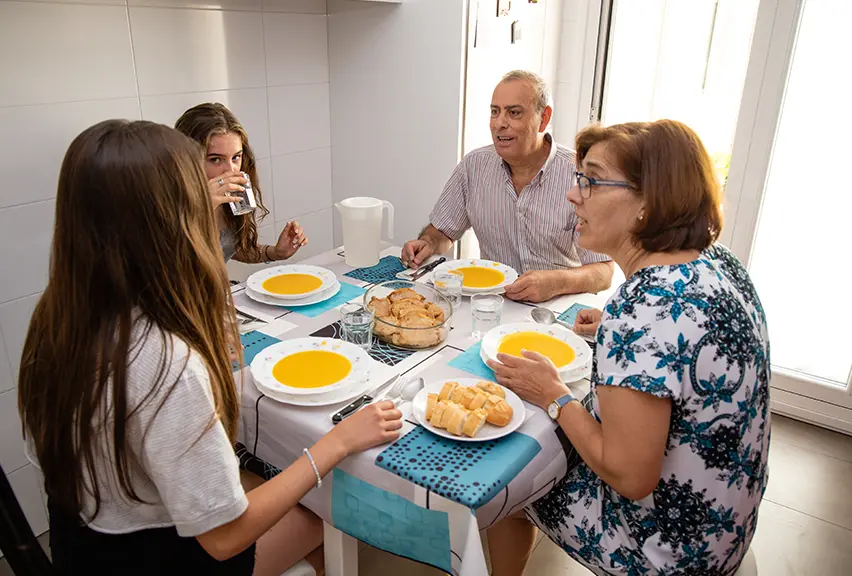
It’s the only way to totally immerse students in the target language.
They’ll have to use the language in everyday situations around the home, which gives them a unique opportunity to live the language and improve both their skill and confidence. And this simply can’t be replicated in the classroom.
A key moment for student-host interaction during the day will be the evening meal (in Spain, this sometimes takes place at lunch, because that’s the main meal of the day).
Over the meal, hosts will encourage students to chat to them. They’ll also be happy to talk to students about their culture and what daily life is like in their country (another unique opportunity).
It is important to point out that this isn’t a student exchange and hosts won’t be taking your students out and about. Students will enjoy activities as a group. But all hosts will be very keen to welcome your students into their home, to share their culture and way of life with them.
Who are the host families?
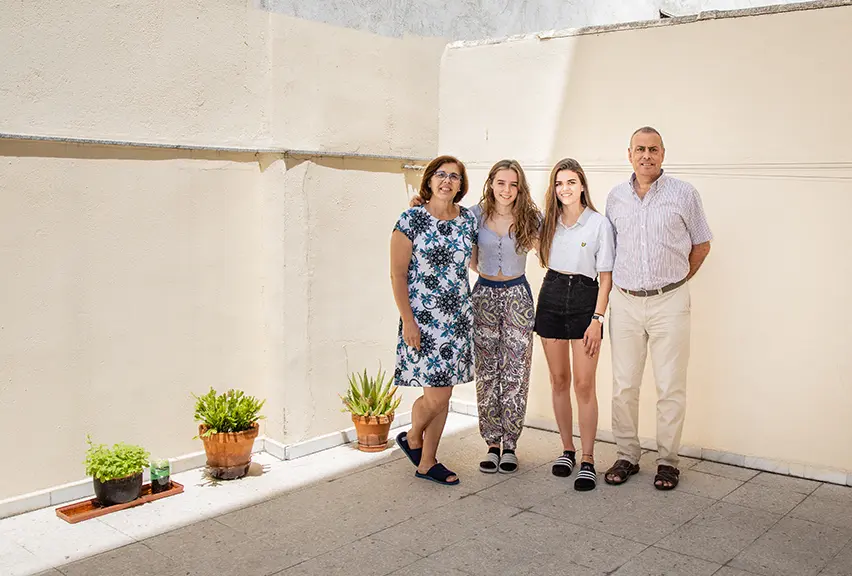
So, when you think of host families, you probably think of mum, dad and a couple of kids.
Most host families don’t look like that. And for a couple of good reasons – families with kids are often time and space-poor. And those are the two things students really need.
There’s no value to students staying with a host family that can’t provide comfortable accommodation and has no time to spend with them.
In reality, most host families usually consist of older ladies who have had children who have grown up and left home already. Sometimes, the hosts may be an older couple.
Actually, they come in all shapes and sizes, but what’s most important is that the language school’s dedicated Accommodations Officer will have checked them out to make sure the accommodation is safe, clean and appropriate, and that the hosts will provide the experience students are looking for.
Most host families have been working with our partner language schools for many years and are very experienced, so they’ll know how to make sure your students feel comfortable quickly.
How are the host families selected?
So, this is probably the most important question for your students’ parents and guardians.
The School Travel Forum has set out some guidelines on host family selection. When we’re deciding whether or not to work with a language school, we require them to follow these guidelines before we’ll offer host family accommodation:
- All host families must be carefully selected, paid for and advised by the language school on how to accommodate international students.
- Each language school must have a specialist accommodation officer (whose role is to visit and select host families, using their experience to place students with the correct family, obtain regular feedback from students and group leaders, and deal with any issues that might arise).
- Students must be placed in groups of two or more (so they can travel to and from school together).
- The details of each host family selected for your group should be made available to you before you travel (this is usually sent to us about two weeks before you go).
- Every effort must be made to take allergies, dietary requirements and religious observances into account (as long as they’re submitted to us in advance).
- The accommodations officer at the language school must help to move any students who aren’t happy with the hosts they’ve been placed with.
Are host families DBS checked?
DBS checks aren’t available outside of the UK. However, we only offer host family accommodation in destinations where the language schools can guarantee every adult (18+) in the home has a clean police record.
For GDPR reasons, copies of police checks can’t be shared with you. But if you need something to support your risk assessment, most schools can provide a generic statement or contract. If you do need this, please let us know at the time of booking, ideally (or at least by the time you start working with your Itinerary Coordinator), because it can take a while for the documentation to be processed.
Will our students be the only students in the host family accommodation?
Your students might be placed in host family accommodation where other students from the language school are also being hosted.
When this is the case, those students will also be under 18 and will be of the same gender as your students.
Your students will only share rooms with students from their group (and so will not share rooms with students from another group).
How far from the school do host families live?
Host families usually live within 30 minutes of the language school on foot or by public transport.
And accompanying staff will then be accommodated as centrally as possible, so it’s easy to reach students’ accommodation if they need to.
Will host families walk students to school?
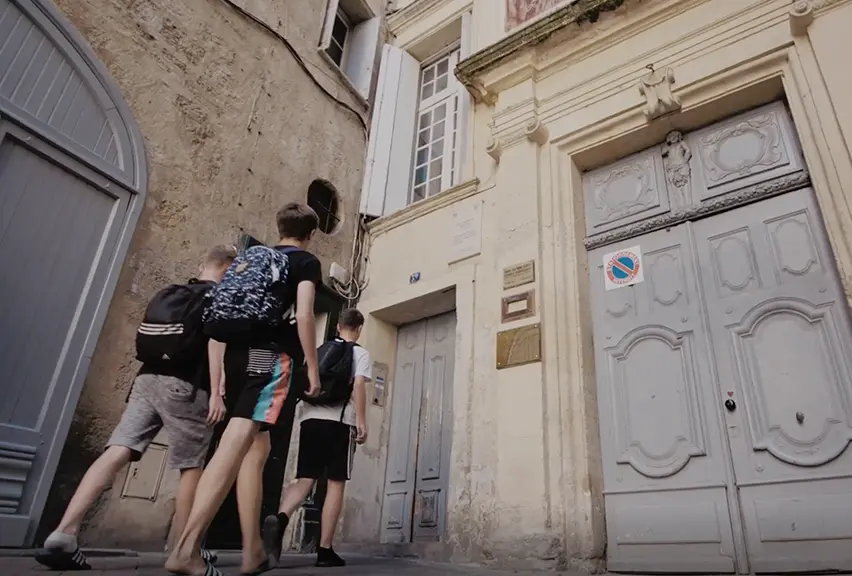
Host families are asked to accompany students to school on the first morning. If they’re unable to do so on the first morning (due to work commitments, for example), then hosts will usually do a walk-through the evening before.
For the rest of the week, students will be expected to make their own way to the language school. Remember, they’ll have at least one other student from the group staying in the accommodation with them and they’ll be expected to travel together.
If students do have any issues travelling to and from the school, they’ll be able to contact staff at the school for help.
Depending on the destination, students may be provided with maps and local travel cards (we’ll let you know on your quote if this is included with your chosen destination).
If you do want maps showing the route from the accommodation to the school, we can arrange this. Please just make sure you give your Itinerary Coordinator at least a month’s notice if you do. We’d also recommend students tag key locations on Google Maps before your trip.
If you do want students to be accompanied to school each morning, you must request this when you enquire (and there will be an additional fee for this service).
We won’t be able to confirm this is possible until we’ve checked with the language school. Honestly, the majority of hosts won’t be able to offer this because of their own work commitments, so it will be a case of the school having to check they have enough hosts who can.
As an alternative, we can help you to coordinate a central meeting point, where you can gather as a group before travelling to the school together each morning.
It’s worth pointing out at this point that, however students travel to school, as group leader, you’ll still have overall responsibility for students while they’re on the trip.
Will students have their own room?
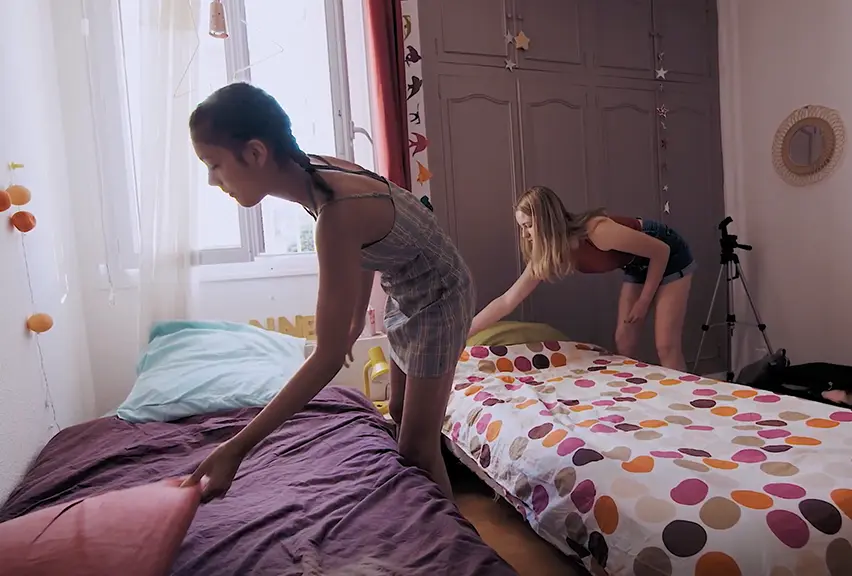
Usually, no. Students will be usually share a room with at least one other student from your group of the same gender. And we think this offers them the best experience, as they’ll have someone to travel to and from the school with.
And, although it’s an amazing experience, it can be a little nerve-wracking at first, so having a pal there with them does tend to make students feel a bit more comfortable, so they can relax and make the most of their time with their hosts.
Can students choose who they share with?
We’ll ask you to place your students into groups of 2, 3 or 4 based on who they’d like to share with. And we’ll need you to send us this information as far in advance as possible (you’ll be sent the relevant forms fairly quickly after booking).
Usually, students will share a room with their classmate(s) (in single beds), as we don’t recommend they have their own rooms.
Now, we totally understand that friendship groups can be really complex for young people. And we know that it’s impossible to guarantee they won’t change before you travel. So, it’s usually possible to make adjustments if necessary.
However, any adjustments made will have knock-on effects for other students in your group. So, we just ask that you make sure you consider that carefully before requesting any changes to rooming.
Another thing to mention is that more than one pair might be placed together in one host family. Where this is the case, we’d recommend you speak to students about embracing the spirit of staying with hosts in a new environment.
There may be other students (i.e. not from your group) staying in the same host family accommodation as your students. When this is the case, those students will also be under 18 and of the same gender as your students. And while your students will usually share rooms with each other, they will never share rooms with students from another group.
The other students will be from non-British groups, to encourage the use of the target language as the common language within the home.
And, actually, this is a lovely opportunity for students to make international friends, learn something about their culture too, and practise speaking the target language with people of a similar age to them who are sharing the experience with them.
If you need your students to be the only students accommodated within the host family, then there will usually be an additional fee to pay and you may well need to place more of your students within the host family (i.e. 4-5) to fill the available spaces.
This isn’t possible in all destinations, so you must make us aware that sole-occupancy is a requirement when you enquire.
Will students have en-suite bathrooms?
Again, usually the answer is no because most homes tend to have one shared family bathroom.
Will students have a curfew?
Unless you tell us otherwise in advance, students will be expected to stay with their hosts in the home once they’ve returned for the evening meal. And you’ll agree this time with us in advance of your trip.
Keys may be provided for students if necessary, but really they should never be in the home without adult supervision.
What happens if the students are unhappy with their host family accommodation?
In the unlikely event that there is an issue with one of the host families, students should either speak to you or another accompanying member of staff immediately. You’ll then be able to work with either the language school director or the accommodations officer to resolve things at the language school during their opening hours. Of course, we can assist you with this if needed.
In case of an emergency, you’ll be given an emergency contact number for the language school and a separate emergency contact number for us. And you could provide students with a safe word to use. Of course, in the case of a medical emergency, you should always contact local emergency services.
What meals are provided?
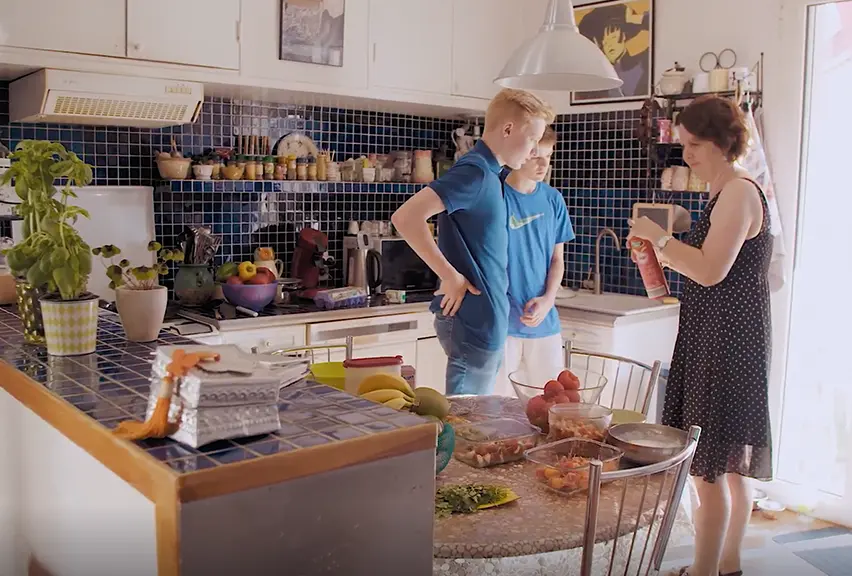
Most meals are provided by the host family (in some destinations, the language school will provide a packed lunch).
The main meal of the day is the time for students and hosts to spend time chatting in the target language. In most places this is the evening meal, but in some parts of Spain this happens at lunchtime (we’ll let you know if this is the case).
It’s also worth mentioning here that if you are going to Spain, the evening meal is much later than in other parts of Europe, so students aren’t usually expected home quite as early in the evenings.
Can host families cater to special dietary requirements and allergies?
Yes, but it’s really important you send us this information at least 3 months before you travel.
That’s so that the accommodations officer can make sure any students with special dietary requirements or allergies are allocated to hosts that understand and are able to cater for this.
Please be aware that if any students do have highly complex needs (whether that’s medical, dietary or SEND), it can be difficult (and costly) for hosts to cater for these. In these situations, we’ll always discuss the options carefully with you. If necessary, an extra fee may be charged (to cover the costs of providing specialised food, for example).
When will we know who our hosts will be?
We’ll send you the host families’ profiles once we receive them from the language school. This is usually around two weeks before you travel.
Once you’ve received these, it’s a really nice idea for students (or their parents) to send their hosts a quick email or WhatsApp message. This breaks the ice and provides a bit of reassurance for students and parents (and probably the hosts, too).
Will students be accommodated with smokers?
We always try to avoid placing students in host families with smokers where possible. Occasionally, there may be a member of the family who smokes – but when this is the case, they will only smoke outside and away from the students, so they’re still staying in a smoke-free environment.
Does Halsbury Travel have the appropriate accreditations?

We’re members of the School Travel Forum and hold a Learning Outside the Classroom Quality Badge, as well as other accreditations, which are your guarantee that we’re a reputable tour operator that will prioritise your group’s safety.
We’re also valued agents of both International House and the International Association of Language Centres (which many of our partner schools are accredited by), so you can be sure we only work with reputable language schools.
We also meet with and visit our language schools regularly to make sure we continue to have a strong partnership and they continue to adhere to our high standards.
We hope this has helped to answer most of the questions your students (and their parents) have about host family accommodation. If you need any further information or advice, please don't hesitate to get in touch.
And if you'd like to hear about the experience from a real school group, we'd recommend checking out Tanglin Trust's case study from their trip to Granada.